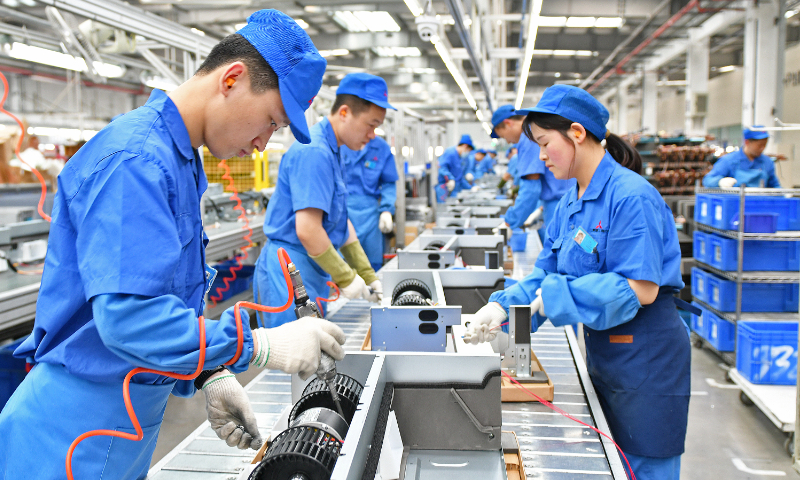
Workers assemble air conditioners at a factory in Qingdao, East China's Shandong Province, on May 16, 2023. Air conditioning enterprises have entered the peak season of production and sales and are running at full speed. In 2022, China's exports of central air conditioning equipment reached 13.5 billion yuan ($1.9 billion), a year-on-year increase of 21.0 percent. Photo: cnsphoto
The profit decline of China's major industrial enterprises continued to narrow in April with revenues growing faster, official data showed, maintaining a recovery trend.
Despite some weak readings for the economy in the month due to objective challenges, the overall economic rebound and its internal momentum shouldn't be questioned or ignored, experts told the Global Times.
The profits of China's industrial companies with annual main business revenue of at least 20 million yuan ($2.83 million) fell 18.2 percent year-on-year in April, narrowing 1 percentage point from the reading in March, data from the National Bureau of Statistics (NBS) showed on Saturday.
Combined revenues rose 3.7 percent, accelerating by 3.1 percentage points from the previous month.
Of the 41 industrial categories, 23 posted better profits in April compared with March, the NBS said. For example, the equipment manufacturing sector reported a profit increase of 29.8 percent year-on-year in April, reversing a decline in March.
For the first four months, those companies' profits fell 20.6 percent on a yearly basis, compared with a 21.4 percent decline in the first three months, according to the NBS.
The decline, although not a slight one, was mainly seen in such sectors as computers, telecommunications and other electronic equipment manufacturing, which registered a slump of 53.2 percent; non-ferrous metal smelting and rolling processing, which declined by 55.1 percent and the chemical raw materials manufacturing industry, which tumbled by 57.3 percent.
"Externally, the West's attempt to disrupt China's industrial chain at the manufacturing node, coupled with weakening demand in overseas markets, has had a negative effect on industrial firms," Dong Dengxin, director of the Finance and Securities Institute of the Wuhan University of Science and Technology, told the Global Times on Sunday.
Meanwhile, the domestic property sector, which could lift multiple industries' prosperity, is still faced with ebbing demand although signs of a recovery have emerged, according to Dong.
In the January-April period, the floor area of commercial housing sales fell by 0.4 percent year-on-year, 1.4 percentage points less than in the January-March period, showing that efforts made in the first quarter to stimulate reasonable housing consumption are taking effect.
Industrial profits maintained the recovery trend, NBS statistician Sun Xiao said, while warning that industrial companies face difficulties such as a grim and complex international environment that restrains demand.
"Weak demand and the expanding decline of the producer price index will continue to drag on the profits of domestic major industrial firms for a while," Wu Chaoming, deputy head of the Chasing Research Institute, told the Global Times on Sunday, adding that the difficulties companies have at the micro level might be more than those reflected by the macro data.
The industrial profit readings came after many other economic indicators were released for April, including industrial output, retail sales and property investment.
Despite the objective challenges, the overall pace of the economic rebound and its internal momentum should not be questioned or ignored, experts said, disputing the tone that some Western media have used in hyping China's economy, claiming that the recovery of the world's second-largest economy is losing steam.
"We are not losing recovery momentum, only the momentum is showing differentiation. For example, services industries that were severely affected by the pandemic will continue to recover, as will domestic consumption, which will provide a better driving role for the economy," Wu noted.
Retail sales jumped by 18.4 percent in April, rising sharply from a 10.6 percent increase in March, the fastest gain since March 2021. It continued the momentum in the first quarter when consumption contributed around two-thirds of China's economic output.
Wu said that more policy stimulus will be rolled out to stabilize the economy and employment. "Domestic demand is expected to recover gradually, to better support the improvement of industrial firms' profits."
Sun of the NBS said at the next stage, efforts should be made to restore and expand demand, further improve the level of connection between production and sales, boost the confidence of business entities and promote the continuous recovery of the industrial economy.
"Even though those indicators suggest that the rebound of some sectors has slowed a bit, the overall trend of a robust domestic recovery has not changed," Zhou Maohua, an economist at Everbright Bank, told the Global Times.
The UN Department of Economic and Social Affairs lifted its forecast for China's economic growth to 5.3 percent this year, according to its mid-2023 report on economic expectations released earlier this month, up from the 4.8 percent forecast in January.




